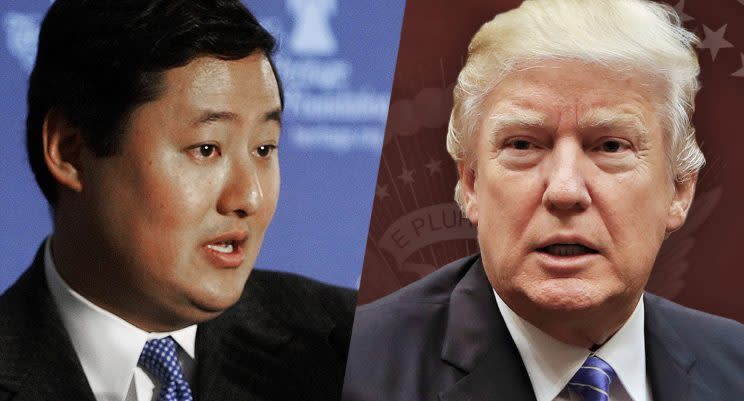‘Torture Memos’ author John Yoo thinks Trump has gone too far

John Yoo, the constitutional scholar who wrote a controversial opinion backing President George W. Bush’s authority to torture terror suspects, now believes President Trump is overstepping his authority in numerous areas of foreign policy.
Yoo’s assessment, in an op-ed in Monday’s New York Times, is not particularly novel or unique in the current political climate, with tremendous resistance to the Trump administration throughout the country. But it is noteworthy coming from Yoo, who is widely known for his expansive views on presidential power.
Yoo, a professor of law at the University of California, Berkeley, served as a deputy assistant attorney general for the U.S. Department of Justice’s Office of Legal Counsel from 2001 to 2003. During this time, he penned the legal documents that have come to be known as the Torture Memos, which advised Bush, the Justice Department and the CIA on the use of “enhanced interrogation techniques,” such as waterboarding.
In his essay, Yoo argued that Trump has provided little evidence that he understands the three branches of U.S. government and has said he wants to represent the will of the people, “seemingly without any constitutional restraint.”
He cited Trump’s executive orders to ban immigration from Muslim-majority countries and build a border wall between the U.S. and Mexico, as well as his vow to overturn the North American Free Trade Agreement (NAFTA).
“A successful president need not have a degree in constitutional law. But he should understand the Constitution’s grant of executive power,” Yoo wrote. “He should share Hamilton’s vision of an energetic president leading the executive branch in a unified direction, rather than viewing the government as the enemy. He should realize that the Constitution channels the president toward protecting the nation from foreign threats, while cooperating with Congress on matters at home.”
In guiding Bush, Yoo said he followed in the footsteps of Founding Father Alexander Hamilton, who believed Article II of the Constitution vests the president with a tremendous amount of “executive power.” He said the Guantánamo Bay detention camp, military trials and “enhanced interrogation” (which is widely seen as a euphemism for systematic torture) were perfectly legal. Still, he said, he has serious concerns over Trump’s use of executive power.
According to Yoo, Trump’s order to build a border wall and his plans to tax Mexican imports are unconstitutional because the Supreme Court found that border control lies with Congress — not the president. He also said that Trump’s vow to pull out of NAFTA is concerning because the president does not have the authority to singlehandedly end tariff and trade laws. After all, he said, Congress entered into the deal with Canada and Mexico by statute. Yoo said that Trump’s executive order on immigration brings him “deeper into the constitutional thickets.”
“Even though his executive order halting immigration from seven Muslim nations makes for bad policy, I believe it falls within the law,” he continued. “But after the order was issued, his adviser Rudolph Giuliani disclosed that Mr. Trump had initially asked for ‘a Muslim ban,’ which would most likely violate the Constitution’s protection for freedom of religion or its prohibition on the state establishment of religion, or both — no mean feat.”
Though controversial, Yoo is a prominent and influential scholar on the limits of executive power. He is the author of “Crisis and Command: A History of Executive Power From George Washington to George W. Bush.”
Yoo did not immediately respond to a request for comment from Yahoo News.
In 2009, shortly after taking office, former President Barack Obama, formally reversed all legal guidance from Yoo and his successors in the Office of Legal Counsel during the Bush era.
Read more from Yahoo News:



